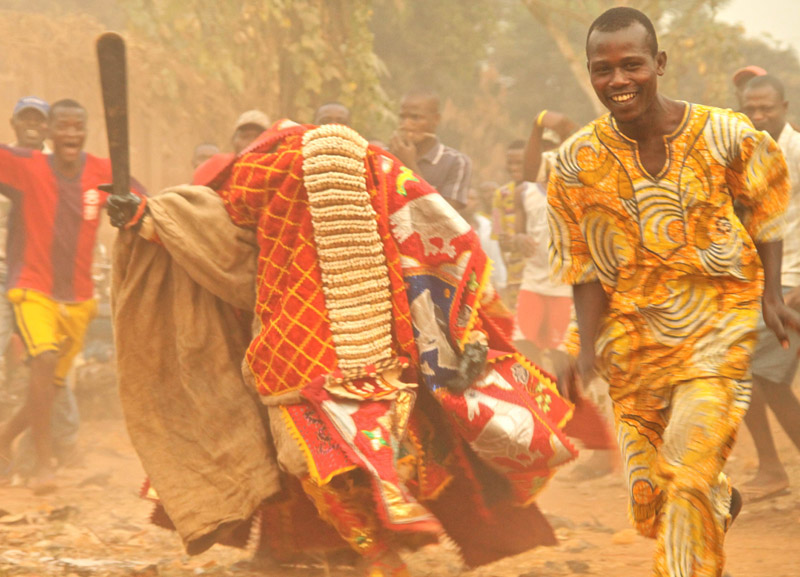Experiential Viewing: An Interview with Hisham Mayet
American film maker Hisham Mayet has produced films on music from various traditions for over a decade, focusing mostly on North and West Africa. Together with Alan Bishop he runs Sublime Frequencies, a record label that releases “obscure” recordings from many parts of the world.
Mayet was born in Libya and has lived in the UK and the US since. He is currently on tour in Europe to promote his latest film Vodoun Gods on the Slave Coast. In an email exchange with KNiK he tells about making low-budget films, how his films avoid hasty contextualizations, and sending audio letters to his family.
Do you remember the first recording (audio or video) you ever did?
Yes, as a child, I remember doing audio letters to cassette to my relatives as a way to communicate instead of having to write letters. My mom would sing on them and we would all be laughing and joking… It was always an experience to rewind and listen before we mailed off the tapes.You have filmed an incredible amount of performances. Are there days that you’d rather just watch a performance instead of film it?
Of course there are days I would rather take it all in than concentrate on trying to document it. I tend to get more lost in the music or ritual at hand. It’s actually quite liberating not to be filming, as then I get to see so many other peripheral activities going on, people, situations, etc… But, I’m always happy to do the work of documenting it and having it to be shared later.
Have there been moments that you felt that the presence of your camera influenced a performance positively?
Certainly. There always exists an added layer with the camera rolling. I feel musicians respond more positively to the situation and certainly dramatic shifts in people’s attitude transpires when the camera is on them.
And negatively?
I’m always setting up a situation now beforehand, so the issue of a negative response is non-existent.
Your films don’t offer background information, explanations or analyses about the performances they feature. Why?
I’ve always felt that traditional documentaries with narration were quite limiting in scope. With my films, I’m seeking a more subjective approach that emphasizes an experiential viewing. I’d like the viewer to be fully immersed in the film, not feeling outside of it by all the contextual information that one would have to read or listen to while events are unfolding in the film.
It’s quite impossible to try to explain most of what I’m filming in an hour long film. I’m coming at these projects in a more abstract and poetic direction. It’s more lyrical and profound than objective and scientific. I’m not an anthorpologist or sociologist. My films refuse hasty contextualizations and rote interpretations that, far from “explaining” cultural displays, deaden viewers to the presence of mystery. Avoiding the temptation to reduce ritual to a simple matter of ends and means, the silence respects the chasm that separates concepts like “possession” from their lived reality. Rejecting the distractions of an imaginary understanding in favor of simple attention and humility, my films trace the portal to deeper knowledge counseled in a centuries-old Sufi prayer: “O Lord, increase my bewilderment.”
Do you talk about the performances and rituals with the people who did them for your own understanding or research?
Of course I’m in constant dialogue with performers and people who I document. It’s an involved process and that relationship has to be built before I can share the experience with them.
The costs for producing your films are very low. As you said before you believe that your method is something that eventually will change culture: “taking it out of the hands of academia, the corporate industry, and the bureaucracy of the funding agencies that prohibit this material being dealt with in the now!”
Is this DIY way of making films still your method or has it changed overtime?
It’s still 10 years later my method. My latest film cost about $2000 to make, and that includes flight tickets and on the ground travel expenses… I don’t know of a single person that could make the same film for that little money. I’ve been doing this now for long enough that I’m able to produce with very little help. Although I don’t want to continue to have the same budget concerns that I’ve been dealing with since the beginning, I’d certainly welcome a no strings attached producer or benefactor that could further my work into the next level.
Your film Vodoun Gods on the Slave Coast focuses on music and performance in Benin. Do you have any ideas on how music in West Africa will develop in the future, will there be any new musical styles?
I have no idea how music in West Africa will develop. Its changing so rapidly now, it’s hard to capture all of it in any capacity. There are many people doing a lot of documenting now, so it’s being preserved in some fashion, but like any other area on this planet, the velocity of change is overwhelming. Technology and the internet and mass communication tools are creating a new paradigm shift in how information and culture is transforming.
Hisham Mayet presented his film Vodoun Gods on the Slave Coast in OCCII in Amsterdam on November 16th 2013.
See the full tour schedule here.
Herinner je je de allereerste opname die je ooit maakte (audio of video)?
Ja, als kind verstuurde ik audiobrieven op cassettes naar mijn familie om zo met hen te praten in plaats van brieven te schrijven. Mijn moeder zong meestal en we moesten allemaal lachen en maakten grapjes… het was altijd een hele ervaring om de cassette terug te spoelen en dan te luisteren voordat we de tapes opstuurden.
Je hebt ongelooflijk veel optredens gefilmd. Zijn er dagen dat je liever naar een performance kijkt zonder het te filmen?
Natuurlijk zijn er dagen dat ik het liever allemaal in me opneem, en dat ik me niet hoef te concentreren op het documenteren van een optreden. Ik ga meer op in de muziek en het ritueel als ik er zonder camera deel van uitmaak. Het is eigenlijk behoorlijk bevrijdend om niet te filmen, want dan zie ik zoveel andere dingen die aan de rand van het gebeuren afspelen: mensen, situaties, etc… Maar ik vind het altijd fijn om iets te documenteren zodat later anderen het ook kunnen zien.
Zijn er ooit momenten geweest dat je ervoer dat de aanwezigheid van jouw camera een optreden positief beïnvloedde?
Absoluut. Er is altijd een toegevoegde dimensie wanneer de camera meedraait. Ik zie dat muzikanten positiever reageren op de situatie om hen heen en er is meer te zien van wat de muziek met de mensen doet wanneer de camera op hen is gericht.
En negatieve invloeden?
Ik bereid de opnames altijd goed voor, dus er is nooit een negatieve reactie.
Jouw films bevatten geen achtergrondinformatie, uitleg of analyses over de optredens. Waarom?
Ik ben altijd van mening geweest dat traditionele, verhalende documentaires vrij beperkt zijn. Met mijn films probeer ik een subjectievere aanpak neer te zetten die een ervaringsgerichte kijk bevatten. Ik wil dat de kijker volledig kan opgaan in de film, zonder zich buitengesloten te voelen door alle contextuele informatie die moet worden gelezen of gehoord terwijl de gebeurtenissen zich afspelen op het doek.
Het is onmogelijk om te vertellen wat ik precies vastleg in zestig minuten film. De projecten zijn juist abstract en poëtisch. Ze zijn meer lyrisch en diepgravend dan objectief en wetenschappelijk. Ik ben geen antropoloog of socioloog. Mijn films bieden weerstand tegen overhaaste contextualiseringen en mechanische interpretaties, en geven daarmee allesbehalve een uitleg over een culturele voorstelling. Daardoor zou de kijker het gevoel van mysterie worden onthouden. Ik omzeil juist de verleiding om het ritueel te reduceren tot een simpele aaneenschakeling van handelingen. Doordat niet alle vragen beantwoord worden, respecteer je de tegenstelling tussen ideeën als ‘in bezit genomen worden’ en de werkelijk realiteit waarin dat plaats vindt. Doordat mijn films niet zozeer willen begrijpen, maar in de plaats daarvan wel ruimte hebben voor verbeelding en aandacht, vanuit een bescheiden houding, herleiden zij de kijker naar een diepere kennis die in een eeuwenoude Sufi psalm wordt aangeraden: “O God, bestendig mijn verwondering.”
Praat je van tevoren met mensen over de optredens en rituelen die zij uitvoeren om een beter inzicht te krijgen of voor eigen onderzoek?
Natuurlijk ben ik constant in gesprek met de performers and the mensen die ik op film vastleg. Het is een proces waarbij ikzelf altijd ben betrokkenen en ik moet de relatie met hen opbouwen voordat ik die ervaring van het ritueel kan delen.
De kosten voor het produceren van je films zijn heel erg laag. Zoals je ooit zei geloof je dat jouw methode van films maken uiteindelijk iets is dat cultuur zal veranderen: ‘wanneer het uit de handen wordt genomen van academies, de gevestigde industrie en de bureaucratie van subsidiefondsen die voorkomen dat dit materiaal kan worden bekeken en ervaren in het hier en nu.’ Is deze doe-het-zelfwijze van filmen nog steeds jouw methode of is het door de jaren heen veranderd?
Tien jaar later is het nog steeds mijn methode. De laatste film die ik heb gemaakt kostte ongeveer 2000 dollar, en dat is inclusief vliegtickets en andere reiskosten… ik ken niemand die voor zo weinig geld eenzelfde film kan maken. Ik doe dit nu lang genoeg zodat ik films kan maken zonder veel hulp. Werken met een klein budget en de zorgen die daarmee gepaard gaan, mogen van mij weleens ophouden. Ik zou zeker met een gelijkgestemde producer of geldschieter willen werken, zodat ik mijn werk naar een volgend niveau kan brengen.
Jouw film Voudon Gods on the Slave Coast concentreert zich vooral op muziek en rituelen in Benin. Heb je enig idee hoe muziek zich zal ontwikkelen in West-Afrika, kunnen we nieuwe muziekstijlen verwachten?
Ik heb geen idee hoe muziek zich in West-Afrika zal ontwikkelen. Het verandert nu zo snel dat het moeilijk is om in woorden samen te vatten. Technologie, internet en massacommunicatie hebben een enorme verschuiving veroorzaakt in de ontwikkeling van informatie en cultuur. Er zijn veel mensen die van alles documenteren, dus het wordt in ieder geval wel vastgelegd, maar zoals overal in de wereld verandert er veel, en met een overweldigende snelheid.
Hisham Mayet presenteerde op 16 november 2013 zijn nieuwste film Vodoun Gods on the Slave Coast in OCCII, in Amsterdam.
Zie het volledige schema van zijn tour.

